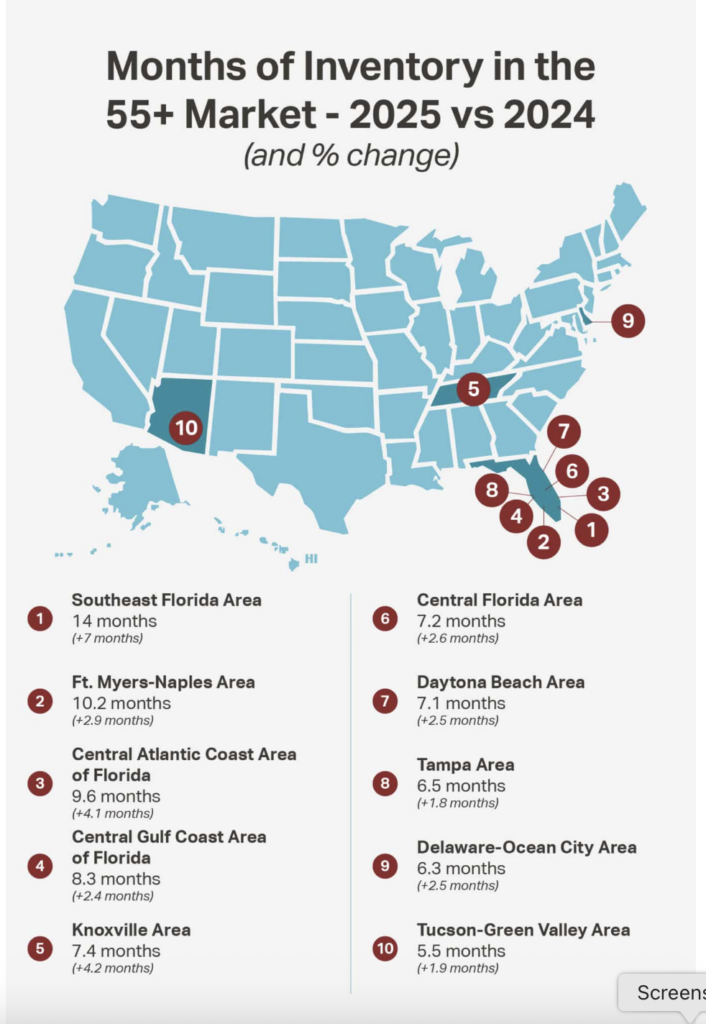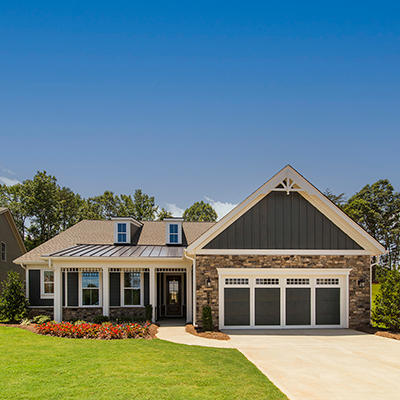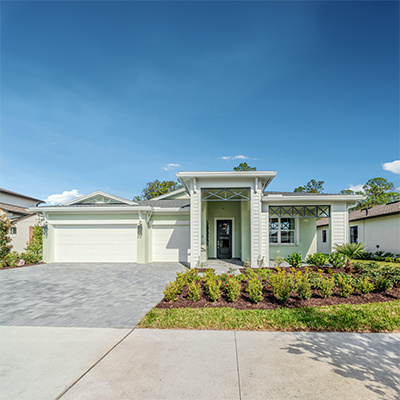Florida’s 55+ Housing Market Slowing Down
Category: Active adult communities
May 7, 2025 — The 55+ housing market in Florida is slowing down, according to a new analysis by 55places.com. One indication is the growing Months of Inventory (MOI) measure, and another is a decrease in prices. Both of these figures are evidence that the Florida market is definitely cooling. Seven of Florida’s market areas, almost the entire state with the possible exception of the Panhandle, are seeing big year over year increases in inventories, a sign that sellers outnumber buyers in those markets. Southeast Florida was the hardest hit area in the country, which now has a 14 month inventory. That’s a 7 month increase in the MOI index over 2024 levels. Prices in that market are declining dramatically as well; home price sare off 11% vs. the previous year.
Hardest Hit 55+ Markets
- Florida remains the most impacted state, with significant inventory growth in Southeast Florida (MOI: 14 months) and the Ft. Myers-Naples (MOI: 10.2 months) region. The Central Atlantic Coast area (Stuart) also saw big increases in inventory(MOI 9.4), up 4.1 months vs. 2025
- Knoxville, TN, has also seen a notable increase, doubling its active listings over the past year.
- Price Declines Create Buyer Opportunities: Markets like Austin (-16.3%) and Denver (-14%) have seen the steepest price drops in the 55+ market, making them more affordable options for retirees.
- Florida’s Market Shows Mixed Trends: While some regions like Southeast Florida saw both an inventory surplus and price declines (-11.2%), prices in other parts of the state, such as Tampa and Central Florida, remained relatively stable.

Markets Where Closings Increased
- There was a surge in closings in select markets: Southern Pines, NC, saw a 66.7% increase in closings, while California’s Bay Area experienced a 41.7% spike in sales activity.
What This Means for Buyers and Sellers
Rising home inventories in a key retiree state like Florida are a significant development. Accompanied with a drop in prices, it’s a combination brings both bad news and good news.
The bad news is for people trying to sell their home – more homes for sale mean more competition and lower prices. The news is good for retirees who want to buy a home or condo in the Sunshine State or other market with high MOIs – there is more to choose from and sellers are more likely to negotiate.
For Buyers: Prospective homeowners should look to markets experiencing price declines and high inventory levels, such as Southeast Florida, Knoxville, and Denver. These areas offer increased negotiating power and more housing options.
For Sellers: Those in competitive markets, such as Boston and Chicago, should anticipate higher demand and faster sales, while those in oversaturated areas should focus on strategic pricing and property enhancements to attract buyers.
“With inventory increasing in some areas and sales surging in others, it’s clear that the 55+ housing market remains dynamic. Understanding these trends is essential for making informed decisions.”
Bill Ness, CEO and Founder of 55places.com.
Methodology
55places.com analyzed data from over 70 Multiple Listing Services (MLSs) covering home sales from 2024 to 2025 across more than 2,500 active adult communities. The study focused on both age-restricted and age-targeted communities designed for 55+ residents. Metrics such as inventory levels, closing activity, and price trends were aggregated to provide a comprehensive market overview. The analysis excludes private sales and new construction homes sold directly by builders.






Comments on "Florida’s 55+ Housing Market Slowing Down"
John says:
One of the things the study doesn’t mention is the cause of this market softness . Some of it might just a slowdown in what has been a really hot market for years. But high insurance rates and natural disasters:construction change are undoubtedly a factor .
Admin says:
The Florida housing market has always been crazy. In the 1920's it exploded, then cratered, then came roaring back. By 2006 it was on fire, prices were rising superfast. Then in 2009 the whole state was awash in defaulted properties. Since then home prices have hit one record after another. Maybe it's time for a little catching up. Florida real estate goes up and down, but history says in the long term it marches upwards. The climate and setting are just too appealing.